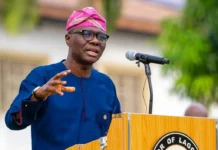 NIGERIA has been placed among countries with the highest cases of software piracy, intellectual property theft and other sharp practices in the Information and Technology (IT) industry. In fact, Nigeria’s yearly losses to the illicit trade are estimated at N82 billion ($513 million).
NIGERIA has been placed among countries with the highest cases of software piracy, intellectual property theft and other sharp practices in the Information and Technology (IT) industry. In fact, Nigeria’s yearly losses to the illicit trade are estimated at N82 billion ($513 million).
These revelations are contained in a document released by Business Software Alliance (BSA), the global body responsible for the advancement of the goals of the software industry.
In the document, which The Guardian obtained, illicit activities such as software piracy, counterfeiting, intellectual property theft were rated as being on the increase. The body therefore canvassed concrete measures to stem the tide.
The group said the effects of software piracy and other vices were not limited to the sector but lamented that software piracy cost the Nigerian economy about N82 billion yearly, which puts a strain on technology companies’ ability to create more jobs and new technologies.
It added that the trend harms local resellers and service firms; lowers government revenues, and increases the risk of cyber crime and security problems.
BSA said reducing software piracy by 10 percentage points over four years could deliver billions of naira in economic growth and thousands of new jobs.
Similarly, the International Chambers of Commerce in its 2011 reports, has warned that without proper clampdown on the nefarious activities of the counterfeit market by various countries, the global piracy and counterfeiting market would surge to $1.7 trillion by 2015.
Software experts in Nigeria, who corroborated these assertions, said the security risks to individuals, businesses and governments posed by counterfeit and pirated software were beyond estimation.
The President, Institute of Software Practitioners of Nigeria (ISPON), Dr. Chris Uwaje, told The Guardian that the growing global threat of software piracy was one problem that neither government nor the IT industry could tackle alone.
Uwaje said the government and industry cooperation on a range of enforcement and policy issues were crucial to ensuring that officials had the needed tools to effectively address piracy.
He appealed to President Goodluck Jonathan to place priority on indigenous software development in the next three years and pursue a well-organised clampdown on criminal syndicates.
The Director of Sales, Africa and Middle East, Motorola Solution, Laurent Tribout, said the government and other stakeholders should step up efforts to check illegal activities in the sector.
Tribout, who blamed majorly, the Asians for the increase in gray market activities, noted that Motorola is working to ensure its products are not counterfeited in Nigeria.
At a recent event in Lagos, former Executive Vice Chairman, Nigerian Communications Commission (NCC), Dr. Ernest Ndukwe, called for stringent measures against intellectual property theft in the country.
Ndukwe said software is very important in the global ICT parlance, describing it as the unseen hand in telecommunications, which draws parallel with spectrum.
Meanwhile, the Cross River State Deputy Governor, Mr. Effiok Cobham, has called for greater efficiency in Nigeria’s telecommunications industry, especially in the services provided by the Global System of Mobile Communications (GSM).
He made the appeal in Calabar, Cross River State on Tuesday at the start of a three-day workshop and roundtable for legislators on legal and regulatory issues in the telecommunications industry.
The deputy governor urged the operators to address persistent complaints on dropped calls, network congestion and high tariffs.
Efiok said the forum would provide the opportunity for the review of the operations of the Nigeria Communications Act (NCA) passed into law in 2003 and other developments in the sector.
The President of the Economic Community of West African States (ECOWAS) Commission, Mr. Kadre Desre Quedraogo, who was represented by Dr. Raphael Kofi, said one of the missions of the group’s Communication and Information Technology (ICT) sector was to harmonise national policies and regulatory frameworks, with the objective of setting up a common liberalised ICT market within the region.
The Chairman, House of Representatives Committee on Communication, Oyetunde Ojo, said his panel was conscious of its responsibilities and the challenges the NCC was facing.




